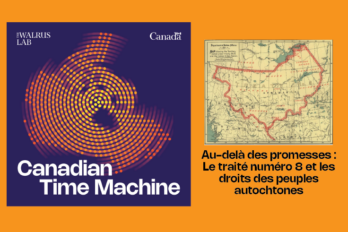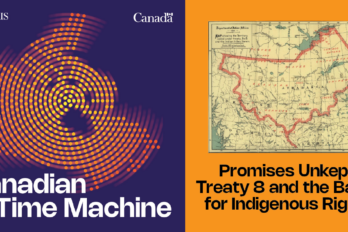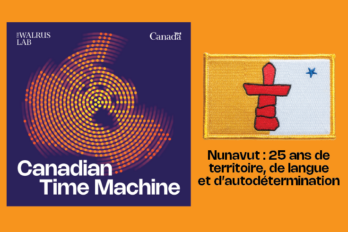SHOW NOTES:
SOURCES USED IN THIS EPISODE
The music for this episode is a licensed version of “This Podcast Theme” by InPlus Music. Additional music are licensed versions of “Stay Cool” by Loops Lab, “Podcast Intro” by InPlus Music, “Limit 70” by Kevin MacLeod.
LINKS MENTIONED IN THIS EPISODE:
- The Amazon First Novel Award
- For the list of side table books our shortlisted authors are reading, scroll down to the bottom of this post
ADDITIONAL LINKS:
TRANSCRIPT:
ANGELA: Welcome to Deep Dive; a weekly podcast that takes a deeper look into the happenings at The Walrus. I’m Angela Misri
SIMRAN: And I’m Simran Singh. This week we announced the short list for this year’s Amazon First Novel Award. This is the 46th time this prize is being given out, and The Walrus is thrilled to be part of it.
ANGELA: We spoke to authors Emily Austin, Lisa Bird-Wilson, Pik-Shuen Fung, Brian Thomas Isaac, Conor Kerr, and Aimee Wall.
SIMRAN: We’ve asked the shortlisted authors the same five questions, and we’ve taken some of their answers and woven them into this episode.
ANGELA: And stay turned till the end of the episode when the authors tell us the books THEY have on their side tables right now.
SIMRAN: QUESTION ONE: Why is this novel important now?
CONNOR KERR: Hey, my name’s Conor Kerr and I’m the author of the novel avenue of champions. Good question. Uh, good question. I, uh, I think right now the current like social cultural climate around true histories, lived experiences and stories of indigenous peoples. And in, uh, my case met people. So starting to break through, into mainstream Canadian Western society, uh, this is something, these stories that they were intentionally hidden for generations. So I think it’s important for non-indigenous Canadians to learn more about how these intergenerational impacts of being removed from land being unwelcome in territories, that your family’s called home forever, how they really affect youth.
EMILY AUSTIN: Hi, my name’s Emily Austin. And I’m the author of everyone in this room will someday be dead. So this is a story about a young lesbian woman going through a mental health crisis. There is a mental health crisis among L G B T Q I plus people or more likely to experience depression, anxiety, substance abuse, and suicidal thoughts in Canada. We’re about five times more likely to attempt suicide. And those numbers are even worse for trans people. Um, despite social improvements, it’s clear right now when we look at our American neighbours in Florida and Texas, and even at some of our own neighbours here in Canada, homophobia, transphobia, and all forms of bigotry remain serious threats. Um, GT Q I a plus people are not inherently prone to depression because of their sexual orientation or gender identity. We’re at a higher risk because of mistreatment and bigotry. Ultimately my books about how we’re all gonna die and how strange it is that we exist. It isn’t about homophobia. It’s about a mentally ill, uh, lesbian. Who’s deeply aware of how important everyone is and how amazing it is that we’re alive.
AIMEE WALL: Hi, my name is Aimee Wall and I’m the author of we Jane. I tend to sort of shy away from words like, uh, important, but what I wanted to do and what I hoped, um, might resonate with people was, um, to tell a different kind of abortion story. Um, one that didn’t need to like look to the past or, or, uh, create some kind of like dystopian future. Um, b ut instead grapple with the situation, um, as it is today, um, in this case, in, in rural Newfoundland, um, the increasingly, uh, grim reality is that questions of, of reproductive justice and access to abortion have only grown, um, more relevant in the years that I was working on the book. Um, and unfortunately, uh, even more so today, um, you know, we’re about to watch Roe V Wade fall in the states. Um, the situation feels increasingly dire. Um, so what I imagined from the start was, um, imagining a group of women, um, deciding to take kind of a side road, um, take the situation into their own hands and, and look at abortion from the perspective of, of care, work and community.
ANGELA: QUESTION TWO: Who is your protagonist?
PIK SHUEN FUNG: My name is Pik Shuen Fung and I’m the author of Ghost Forest.
So the protagonist of ghost forest is a visual artist who turns to her mother and grandmother to ask for their life stories after her father dies. And this family moved from Hong Kong to Vancouver in the nineties before the 1997 handover to China. This was really common hundreds of thousands of people emmigrated from Hong Kong at the time. And it was also really common for the fathers to stay in Hong Kong, to work and provide for their families. And they became known as astronaut fathers cuz they were always flying back and forth. So the protagonist is grieving, not only the death of her father, but also his absence throughout her life. And she’s trying to figure out how to do that in a family that doesn’t really talk about their feelings.
LISA BIRD WILSON: I’m Lisa Bird Wilson. And I’m the author of probably Ruby,
Probably Ruby is about Ruby, who’s indigenous and adopted. And she spends her, um, her life really trying to figure out her identity, trying to figure out, um, you know, where she’s come from and trying to find her way back home. And so for me, Ruby, you know, represents this contemporary embodiment, uh, of what it means to be indigenous on this land today. And if you are an indigenous person on this continent today, that history of, um, colonialism and, uh, violence around colonial history is part of your history, no matter what. And so you see in the book that Ruby Ruby’s family has that history and all of that history is sort of behind Ruby. Um, and Ruby doesn’t even necessarily know it. So this is, this is Ruby in the here and now, but what is it that’s impacted Ruby to be where she is today. And I think that understanding that history, that shared history that we have on this land, it’s not just for indigenous people, um, to know that and to understand it. It’s not just our story, it’s our shared story together. So I think that’s part of why the book is, um, important now to think about those concepts and those themes.
So the main character in the book of course is Ruby. Uh, Ruby is a character who is, uh, she’s sort of got a really big personality. She’s got a big laugh. Um, and she, you know, she takes up a lot of space in the book, uh, and you know, sort of in the room, um, Ruby is, I wanted Ruby. I wanted readers to be able to relate to Ruby in terms of her struggles and in terms of her healing and just, uh, her humanity as an indigenous, uh, person in this contemporary context that we’re in today. Um, Ruby is also, uh, she’s pretty vulnerable, but I think that it’s important to also see that Ruby is not a victim. Uh, she’s very much a survivor. And, um, in part Ruby is also kind of funny.
SIMRAN: QUESTION THREE: Why are First Novels special?
AIMEE WALL:Hi, my name is Aimee Wall and I’m the author of we Jane.
There’s a, a playfulness and an audacity and a, and a weirdness, a kind of a particular kind of freedom to someone writing their first novel, I would say, um, protect that private space, um, you know, write your book for yourself, uh, the way you wanna write it and try not to let the noise of outside voices.
BRIAN THOMAS ISAAC: My name is Brian Thomas Isaac. And I’m the author of all the quiet places. I knew of a writer who had to make a decision in her life. She was kind of at a crossroads and she said that she was either going to be a writer or an alcoholic. And I think that by getting her thoughts on paper, getting those demons out, helped her get through that. Thank you. Uh, reading the greats helped me understand the process of writing. Uh, whenever I hit a roadblock, I would just pick up a book I liked and read. Uh, and when I did, when I read and I would hear the rhythm of a sentence, it would help me. And then sometimes even just one word would get me going again.
CONNOR KERR: Hey, my name’s Connor Kerr and I’m the author of the novel avenue of champions.
But this novel takes on so many of these important stories that I wanted to voice to just get out there. The stories that my grandmother told me that I lived through, people always talk like this book is non-fiction like when I do interviews, but, uh, and I think that’s a compliment though. It’s, it’s definitely fiction. Like my, uh, my granny never sold weed brownies. She just really kept it, the moon shining the entire time. And uh, now those stories are out there.
ANGELA: QUESTION FOUR: What advice do you have for someone writing their first novel?
LISA BIRD WILSON: I’m Lisa Bird Wilson. And I’m the author of probably Ruby,
I think I probably have about three things to say to somebody who’s writing their first novel and the first would be right all the way through to the end. You can edit later, um, but get through through your story and that that’s a struggle and something that’s difficult for me. And so that’s advice that I try to take for myself. Um, the other piece is you’re gonna edit more than you ever thought possible. So, you know, I don’t even know if you can prepare for that, but, uh, it’s definitely, um, something that’s gonna happen. And the other thing is I would say either join or even create a writing group, because I think that one of the things that does is it gives you some structure around your writing and gives you a deadline to write towards. So I have been in a writing group for 20 years now, and I appreciate that writing group more and more as I go along because they do give me that, um, that deadline and that, uh, objective to write towards, towards something that I sort of owe them the next piece, um, of my writing. So those are my pieces of advice.
BRIAN THOMAS ISAAC: My name is Brian Thomas Isaac. And I’m the author of all the quiet places .. reading the greats helped me understand the process of writing. Uh, whenever I hit a roadblock, I would just pick up a book I liked and read. Uh, and when I did, when I read and I would hear the rhythm of a sentence, it would help me. And then sometimes even just one word would get me going again.
SIMRAN: Finally, we got the full list of what all our shortlisted authors have on their side tables, so get a pen and paper handy.
Lisa Bird-Wilson: Dog Flowers by Danielle Geller, Five Little Indians by Michelle Good, Older Sister. Not Necessarily Related. by Jenny Heijun Wills.
Conor Kerr: Swollening by Jason Purcell, Harlem Shuffle by Colson Whitehead.
Emily Austin: Florida Woman by Deb Rogers, Girls Can Kiss Now by Jill Gutowitz, Bad Feminist, Hunger & Difficult Women by Roxane Gay.
Brian Thomas Isaac: Ridgerunner & The Outlander by Gil Adamson, The Grapes of Wrath by John Steinbeck.
Aimee Wall: Luster by Raven Leilani, Love and Other Poems by Alex Dimitrov, The Portrait of a Lady by Henry James.
Pik-Shuen Fung: The Best We Could Do by Thi Bui, Gods of Want: Stories by K-Ming Chang, Braiding Sweetgrass by Robin Wall Kimmerer.
ANGELA: Just kidding, it’s a long list, all the books mentioned by our shortlisted authors are in our show notes.
SIMRAN: Thanks for joining us on this week’s episode of the Deep Dive. This week’s episode was produced by Angela Misri, Alana Hamilton and me, Simran Singh. Angela Misri edited the episode.
Thanks so much to Emily Austin, Lisa Bird-Wilson, Pik-Shuen Fung, Brian Thomas Isaac, Conor Kerr, and Aimee Wall for joining us this week. And we wish them the best of luck in their goal of winning the 2022 Amazon First Novel Award.
The winner will be announced on Wednesday, June 1st.
Music for this podcast is provided by Audio Jungle. Our theme song is This Podcast Theme by Inplus Music. Additional music is Stay Cool by Loops Lab, and Podcast Intro by Inplus Music. Additional music includes “Stay Cool” by Loops Lab and“Limit 70” by Kevin MacLeod.
“Limit 70” by Kevin MacLeod
Link: incompetech.filmmusic.io/song/5710-limit-70
Licence: filmmusic.io/standard-license
Don’t forget to subscribe to the Deep Dive from The Walrus on Apple Podcasts, Spotify, or wherever you get your podcasts.
Until next week when we take our next deep dive.








